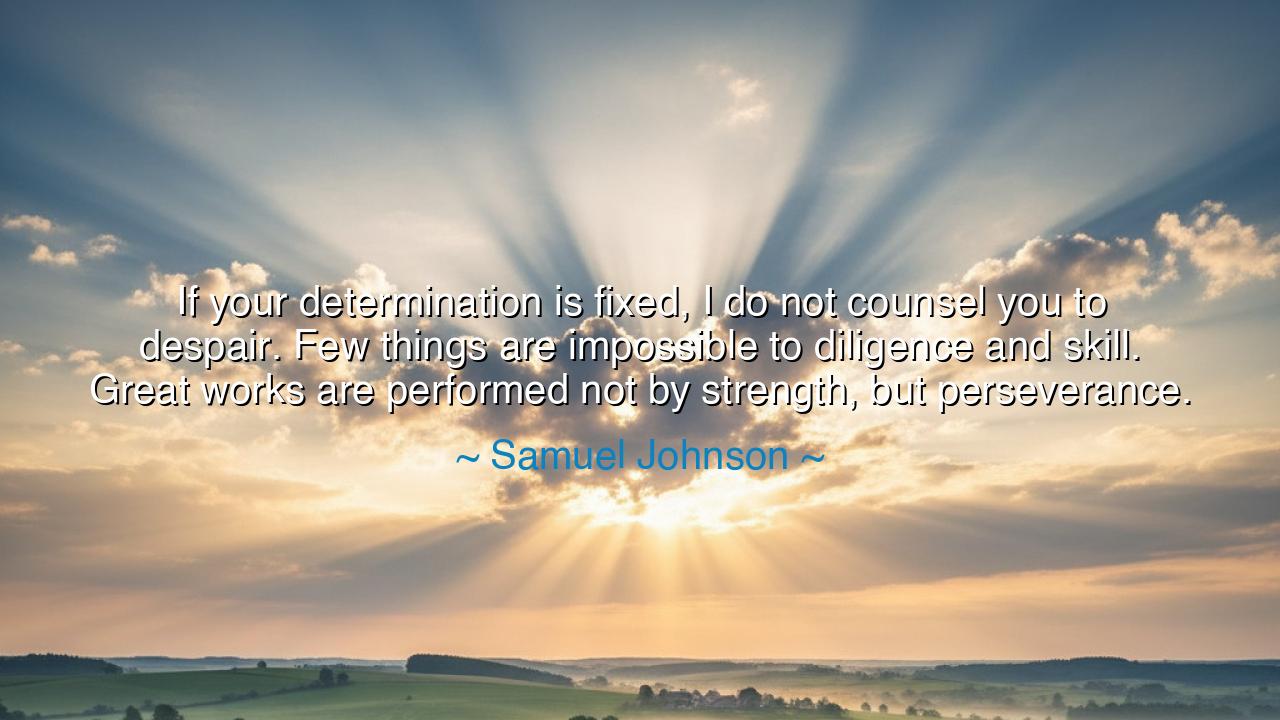
If your determination is fixed, I do not counsel you to despair.
If your determination is fixed, I do not counsel you to despair. Few things are impossible to diligence and skill. Great works are performed not by strength, but perseverance.






In these immortal words, Samuel Johnson, the great moralist and sage of the eighteenth century, speaks as if to every soul wearied by struggle, yet yearning toward greatness: “If your determination is fixed, I do not counsel you to despair. Few things are impossible to diligence and skill. Great works are performed not by strength, but perseverance.” Within this truth lies the law that governs not only the labors of men but the very unfolding of the universe — that endurance, not force, is the architect of creation. The mountains were not raised in an instant, nor the stars born in a single blaze; all things lasting are born through patience, persistence, and faith unwavering.
The meaning of this quote is both simple and eternal: that true success belongs not to the strong, but to the steadfast. Johnson reminds us that life’s greatest triumphs do not come through sudden bursts of power, but through quiet, relentless effort. Strength may conquer in the moment, but perseverance conquers in time. To the one who endures — who rises each time they fall, who works when the world is silent — all things become possible. He counsels against despair because despair is the death of perseverance; it is surrender before the victory is won. As long as one’s determination is fixed, the path, though steep, will always lead upward.
The origin of these words lies in Johnson’s own life, for he knew hardship as intimately as he knew genius. Born into poverty, burdened by illness and melancholy, and long denied success, Johnson nevertheless persisted. His great work, A Dictionary of the English Language, took nine years of relentless labor — without wealth, without assistants, with only faith in his purpose. When he finally completed it, the world stood in awe. His own life thus became a living testament to his philosophy: that diligence and perseverance can achieve what fortune and strength cannot. The pen of Johnson, sharpened by endurance, carved his name into the stone of history.
Throughout history, countless examples bear witness to this truth. Consider Thomas Edison, who, when asked about his many failures while inventing the light bulb, replied, “I have not failed. I’ve just found 10,000 ways that won’t work.” It was not genius alone that lit the world, but unbroken perseverance. Or think of Florence Nightingale, who through tireless compassion and endurance transformed the practice of nursing and saved untold lives. These souls, like Johnson, knew that greatness is not born in moments of triumph, but in years of quiet labor, guided by unwavering purpose.
In the language of the ancients, this teaching echoes the Stoics, who held that the man who perseveres through adversity attains mastery over himself — and thus mastery over life. Perseverance is the companion of virtue; it refines the spirit as fire refines gold. Strength may lift the stone once, but diligence builds the temple. Skill may impress the crowd, but endurance inspires generations. The wise understand that time itself yields to the patient, for all that resists must eventually bend to those who refuse to yield.
The lesson of Johnson’s words is therefore both practical and profound: fix your determination, and despair not. Let your goals be clear, your labor consistent, your heart resolute. Do not measure your progress by speed, but by steadfastness. The storms will come, the path will darken, but he who continues — even one step at a time — will outlast the storm. Perseverance transforms failure into foundation; it turns effort into art. In this way, the humble worker becomes the builder of empires, the dreamer the shaper of worlds.
Therefore, my child, remember this sacred counsel: it is not power, but persistence, that brings the impossible within reach. When your body grows weary and your spirit trembles, recall the words of Johnson — that despair is unworthy of the determined. Cultivate diligence as a habit, skill as a craft, and perseverance as a virtue. The oak does not grow overnight, nor the river carve its valley in a day. But both, through the constancy of their nature, achieve what no sudden force could ever do. So too, through your steady devotion, may you perform your own great work — not by strength, but by the unyielding flame of perseverance.






AAdministratorAdministrator
Welcome, honored guests. Please leave a comment, we will respond soon